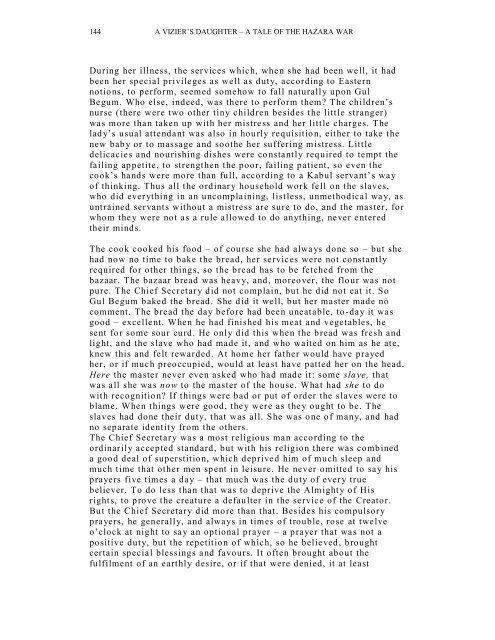You also want an ePaper? Increase the reach of your titles
YUMPU automatically turns print PDFs into web optimized ePapers that Google loves.
144<br />
A VIZIER’S DAUGHTER – A TALE OF THE HAZARA WAR<br />
During her illness, the services which, when she had been well, it had<br />
been her special privileges as well as duty, according to Eastern<br />
notions, to perform, seemed somehow to fall naturally upon Gul<br />
Begum. Who else, indeed, was there to perform them? The children’s<br />
nurse (there were two other tiny children besides the little stranger)<br />
was more than taken up with her mistress and her little charges. The<br />
lad y’s usual attendant was also in hourly requisitio n, either to take the<br />
new bab y or to massage and soothe her suffering mistress. Little<br />
delicacies and nourishing dishes were co nstantly required to tempt the<br />
failing appetite, to strengthen the poor, failing patient, so even the<br />
cook’s hands were more than full, according to a Kabul servant’s way<br />
of thinking. Thus all the ordinar y household work fell on the slaves,<br />
who did ever ything in an uncomplaining, listless, unmethodical wa y, as<br />
untrained servants without a mistress are sure to do, and the master, for<br />
whom the y were not as a rule allowed to do anything, never entered<br />
their minds.<br />
The cook cooked his food – of course she had alwa ys done so – but she<br />
had now no time to bake the bread, her services were not constantly<br />
required for other things, so the bread has to be fetched from the<br />
bazaar. The bazaar bread was heavy, and, moreover, the flour was not<br />
pure. The Chief Secretar y did not complain, but he did not eat it. So<br />
Gul Begum baked the bread. She did it well, but her master made no<br />
comment. The bread the day before had been uneatable, to -day it was<br />
good – excellent. When he had finished his meat and vegetables, he<br />
sent for some sour curd. He only did this when the bread was fresh and<br />
light, and the slave who had made it, and who waited on him as he ate,<br />
knew this and felt rewarded. At home her father would have prayed<br />
her, or if much preoccupied, would at least have patted her on the head.<br />
Here the master never even asked who had made it: some slave, that<br />
was all she was now to the master of the house. What had she to do<br />
with recognitio n? If things were bad or put of order the slaves were to<br />
blame. When things were good, the y were as the y ought to be. The<br />
slaves had done their duty, that was all. She was one of many, and had<br />
no separate identit y from the others.<br />
The Chief Secretary was a most religious man according to the<br />
ordinarily accepted standard, but with his religion there was combined<br />
a good deal of superstition, which deprived him of much sleep and<br />
much time that other men spent in leisure. He never omitted to say his<br />
prayers five times a day – that much was the duty of ever y true<br />
believer. To do less than that was to deprive the Almight y of His<br />
rights, to prove the creature a defaulter in the service of the Creator.<br />
But the Chief Secretary did more than that. Besides his compulsory<br />
prayers, he generally, and always in times of trouble, rose at twelve<br />
o’clock at night to sa y an optional prayer – a prayer that was not a<br />
positive duty, but the repetition of which, so he believed, brought<br />
certain special blessings and favours. It often brought about the<br />
fulfilment of an earthly desire, or if that were denied, it at least



